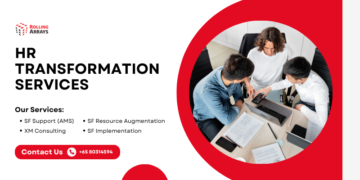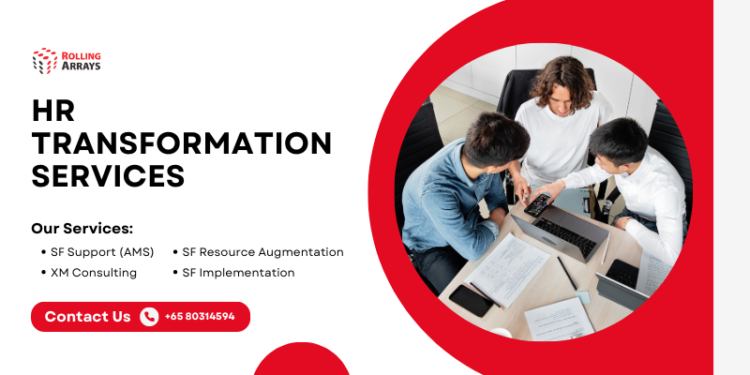In today’s fast-paced and ever-evolving business world, companies face increasing pressure to stay ahead of the curve. To maintain a competitive edge, organizations must adapt not only their products and services but also their internal processes. One of the most critical areas for transformation is Human Resources (HR). HR transformation services offer a strategic approach to modernizing HR practices, enhancing workforce efficiency, and aligning HR functions with broader business objectives. This guide explores how HR transformation services can revolutionize your workforce and drive organizational success.
What Are HR Transformation Services?
HR transformation services involve a comprehensive overhaul of traditional HR practices and systems. These services are designed to streamline HR processes, integrate advanced technologies, and align HR strategies with the overall business strategy. The goal is to create a more agile, efficient, and responsive HR function that supports both employee needs and organizational goals.
Why Embrace HR Transformation?
- Adapting to a Changing Environment: The business landscape is constantly evolving, with new technologies, market dynamics, and regulatory changes. HR transformation helps organizations stay adaptable by implementing flexible HR strategies and technologies that can quickly respond to these changes.
- Enhancing Employee Experience: Today’s workforce expects more personalized and engaging work environments. HR transformation services focus on improving the employee experience by adopting modern tools and practices that enhance communication, development opportunities, and overall job satisfaction.
- Increasing Efficiency: Traditional HR processes can be cumbersome and inefficient. By leveraging automation and data analytics, HR transformation services streamline operations, reduce administrative burdens, and free up HR professionals to focus on strategic initiatives.
- Data-Driven Decision Making: In the era of big data, making informed decisions is crucial. HR transformation services integrate data analytics into HR practices, providing valuable insights into employee performance, engagement, and organizational trends, leading to better decision-making.
- Aligning HR with Business Goals: For HR to be truly effective, it needs to align with the overall business strategy. HR transformation services ensure that HR practices and strategies support organizational objectives and contribute to overall business success.
Key Components of HR Transformation Services
- Process Optimization: A core aspect of HR transformation is optimizing HR processes. This involves reengineering recruitment, onboarding, performance management, and employee benefits administration to make them more efficient and user-friendly. The aim is to eliminate bottlenecks and improve overall HR functionality.
- Technology Integration: Modern HR transformation relies heavily on technology. Implementing cloud-based HR systems, employee self-service portals, and advanced analytics tools can significantly enhance HR operations. Technology integration helps automate routine tasks, improve data accuracy, and provide employees with better access to HR services.
- Change Management: Effective change management is crucial for a successful HR transformation. This involves preparing and supporting employees through the transition, addressing any resistance to change, and ensuring that new HR practices are adopted smoothly. Change management strategies include communication plans, training programs, and ongoing support.
- Talent Management and Development: HR transformation services often focus on enhancing talent management practices. This includes developing robust talent acquisition strategies, improving employee development programs, and creating effective succession planning frameworks. The goal is to attract, develop, and retain top talent.
- Cultural and Organizational Change: Transforming HR also involves fostering a culture that supports change and innovation. HR transformation services help build a culture of agility, collaboration, and continuous improvement, which is essential for long-term success.
The Benefits of HR Transformation Services
- Increased Agility: HR transformation enables organizations to respond more quickly to changes in the business environment. By implementing flexible HR practices and technologies, companies can adapt to new trends, market demands, and competitive pressures more effectively.
- Enhanced Employee Engagement: A modernized HR function that focuses on improving the employee experience can lead to higher levels of engagement and satisfaction. Engaged employees are more motivated, productive, and committed to their work, contributing to overall organizational success.
- Improved Operational Efficiency: Streamlined HR processes and automation reduce administrative burdens and operational inefficiencies. This allows HR professionals to concentrate on strategic initiatives that add value to the organization.
- Better Decision-Making: Data-driven insights provide a clearer understanding of workforce trends and performance. This enables more informed decision-making and strategic planning, leading to better business outcomes.
- Alignment with Business Strategy: HR transformation ensures that HR practices are aligned with business goals. This alignment supports organizational objectives and contributes to overall success.
Steps to Implement HR Transformation Services
- Assess Current HR Practices: Start by evaluating existing HR practices and identifying areas for improvement. This assessment should include feedback from employees, managers, and HR professionals to understand current challenges and opportunities.
- Define Objectives: Clearly define the objectives of the HR transformation initiative. Set specific goals, such as improving efficiency, enhancing employee experience, or aligning HR with business strategy.
- Develop a Transformation Plan: Create a detailed plan outlining the steps and timeline for the transformation. This plan should cover process optimization, technology integration, change management, and other key components.
- Engage Stakeholders: Involve key stakeholders, including senior leadership, HR professionals, and employees, in the transformation process. Their support and engagement are crucial for the success of the initiative.
- Implement and Monitor: Execute the transformation plan and monitor progress regularly. Address any issues and make adjustments as needed to ensure the transformation achieves the desired outcomes.
- Evaluate and Refine: Continuously evaluate the impact of the HR transformation services and refine practices based on feedback and performance data. This iterative approach ensures ongoing improvement and alignment with organizational goals.
Conclusion
HR transformation services offer a strategic pathway to revolutionize your workforce, making your HR function more agile, efficient, and aligned with business goals. By embracing process optimization, technology integration, and change management, organizations can build a modern HR function that supports overall business success. As the business landscape continues to evolve, investing in HR transformation services is a critical step toward achieving long-term growth and competitiveness.
Embracing HR transformation is not just about adopting new technologies or processes; it’s about fostering a culture of continuous improvement and adaptability. By prioritizing HR transformation services, organizations can position themselves for success in a rapidly changing world.
Digital marketing is the use of the internet and electronic devices to promote products or services. It includes tactics like social media ads, email campaigns, search engine optimization (SEO), and online content to connect businesses with potential customers. It's a fast, targeted, and measurable way to reach people where they spend their time—online.





















































